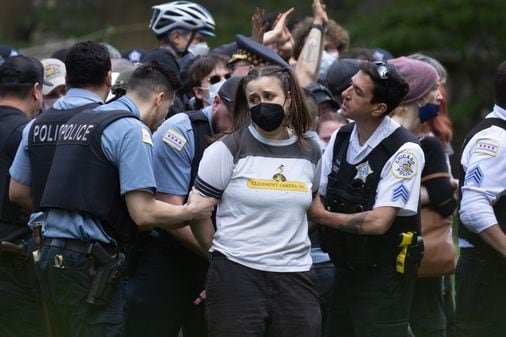The latest debate rocking many U.S. college campuses isn’t about the war in Gaza, but how to deal with students who are accused of crimes or who violate school rules while campus officials are busy protesting and building encampments this spring.
More than 3,000 people have been arrested or detained on charges ranging from trespass to vandalism to assault, and many more for violating school rules regarding assembly. Not surprisingly, many of the students involved argue that their actions amounted to free speech, and are calling for all charges to be dropped and the penalties to be lifted.
Sure, speech is heavily protected by the Constitution. It’s a fundamental right in our democracy. But it’s not an absolute right. In the landmark 1969 case of Brandenberg v. Ohio, the Supreme Court held that speech is not protected if it seeks to incite imminent illegal action and is likely to cause such action. There are other legitimate grounds for restricting speech, such as when speech threatens the public order or is defamatory.
There are other reasons to believe that speech will necessarily be restricted on campuses. Campuses are communities built and maintained for the purpose of learning. Free speech rights must be balanced with the rights of others to enable them to exercise their own free speech rights, to hear comments that some people find offensive, to attend classes, to attend graduations, and to continue to live and learn without feeling intimidated. Here, as anywhere, individual rights must be balanced with obligations to others.
Some administrators and faculty believe that denying degrees or expelling students who are found to have committed one or more violations is too punitive, while others argue that in order for the rules to be deterrent and to ensure that all students can obtain the education they want, students have made an informed choice and must face the consequences.
These decisions are never simple or easy. In many cases (where violence or destruction of property is not evident), expulsion or revocation of degrees seems a bit too harsh, especially when existing rules are not easily enforced or the penalties for breaking these rules are unclear. It is also more punitive than deliberate. At the same time, leaving those who knowingly break the rules unpunished sends a frightening message. So I propose an alternative path: remedial education.
I would encourage administrators to require protesters who violate the law or university rules to pass exams in two areas in order to have the charges dropped, or to earn their degrees or be reinstated. After all, we are talking about an educational institution, so what better way to do this than to insist on education related to the behavior deemed unacceptable?
First, students who may face disciplinary action or legal prosecution are expected to demonstrate civic competence. This includes familiarity with the central texts of civil disobedience, which hold that those who break the law should avoid violence but be prepared to pay the price for their actions. They are expected to read the works of leading thinkers such as Henry David Thoreau, Martin Luther King Jr., and Mahatma Gandhi. The course should also include instruction on Supreme Court decisions regarding freedom of speech and assembly.
Second, students must demonstrate an understanding of Middle Eastern history, particularly the Israeli-Palestinian conflict. Required reading will cover the history of Zionism and Palestinian nationalism, the various legacies of the British Mandate in Palestine, the partition attempt, Israeli independence and the reactions to it, the 1967 war and its long-term effects, successful and unsuccessful diplomatic efforts, demographic and political changes, and events before, during, and after the October 7 Hamas attack on Israel.
There is no reason why such education should be limited to students facing penalties. Ideally, all students would be required to take a mini-course at the beginning of the academic year learning civics and how it applies to dealing with differing viewpoints on controversial issues. In the near future, debates focusing on the Israel-Hamas conflict should be central to such a curriculum. In this format, students are asked to explore both sides of an argument, defending one and then the other, building both understanding and empathy that are sorely lacking in many universities. Civility and nonviolence are essential. Professors tell students where to go for accurate information and analysis rather than advocacy.
School officials should be under no illusions that what happened this spring was a one-time event. Peace has not yet come to the Middle East, and protests will likely resume in the fall or earlier. The goal should be to protect free speech, but in a way that is consistent, protects the rights of all students, and supports the school’s mission of education.
Richard Haas“I think it’s important to be aware of the current situation,” said the president emeritus of the Council on Foreign Relations and senior counsel at Centerview Partners.Obligatory Law: 10 Habits of Good Citizenship. “

